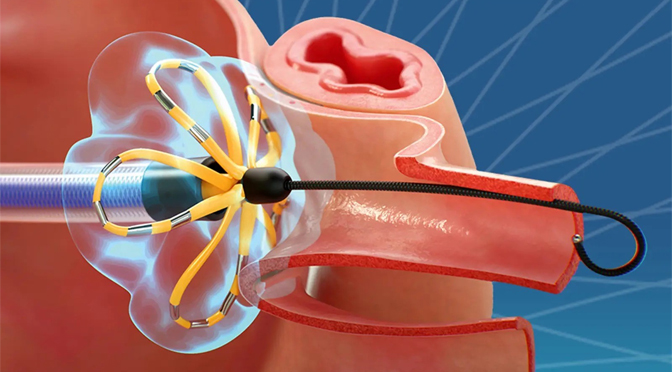|
|
Image provided to TVL by St. Luke’s University Health Network (SLUHN)
St. Luke’s cardiac electrophysiology team is first in the Lehigh Valley and Northeastern Pennsylvania to offer Pulsed Field Ablation (PFA), a new and improved treatment for atrial fibrillation (afib). This common heart rhythm disorder affects nearly 40 million people worldwide and, if not treated, can cause the formation of blood clots or a stroke and congestive heart failure.
The first PFA cases in the Lehigh Valley and Northeastern Pennsylvania were performed on May 6 at the St Luke’s University Hospital Bethlehem Campus. As of mid-May, the team has completed 10 of these procedures. This technology also is available in select major heart centers in New Jersey, New York and throughout the nation.
Retired basketball great Kareem Abdul-Jabbar was diagnosed with afib after experiencing lightheadedness, weakness and an accelerated and disorganized heartbeat and last year started a campaign to raise awareness of afib. Advanced age, obesity, sleep apnea, alcohol use, heart valve disorders and heart failure put people at a high risk for developing atrial fibrillation. Other famous people whose atrial fibrillation is public knowledge include Presidents George Bush and Joe Biden, Boston Celtics retired superstar Larry Bird, comedian Howie Mandel and entertainer Barry Manilow. It is a disease that will affect one in five people by the time they turn 80 years old.
Fortunately, there is hope, as ablation technology has become safer and more effective, and now is recommended first line by the American Heart Association to treat afib. The newest technology in ablation is Pulsed Field Ablation, which is faster, safer and at least as effective than the conventional methods of ablation, which use radiofrequency and cryotherapy (cold temperatures) to remove problematic heart cells. Pulsed Field Ablation is a high-voltage electrical impulse delivered through a catheter through a small needle puncture in the vein the patient’s leg, which renders targeted heart cells, at the top chambers of the heart—the atrium—inert and unable to generate an afib episode.
According to Steve Stevens, MD, one of five St. Luke’s Cardiologist and Electrophysiologists who perform ablations routinely, “Pulsed Field Ablation is a ‘game changer’ that will eventually become the preferred therapy for afib, because: 1) it is much faster than traditional ablation; 2) it is cardio-selective and doesn’t damage other organs near the heart like the esophagus and lungs, which can happen during conventional ablations; and, 3) it can be done with less invasive anesthesia and monitoring techniques since there is less risk to other organs, making it a safer and a less invasive experience for the patient.” Dr. Stevens estimates that the majority of atrial fibrillation ablations will eventually be done with PFA, which received FDA approval in late 2023.
The St. Luke’s Cardiac Electrophysiologists, Darren Traub, DO; Sudip Nanda, MD; Hardik Mangrolia, MD; Kevin Mills, MD; and Dr. Stevens have trained for over eight years after graduating medical school to provide this innovative procedure, among others, and are regional experts in all heart rhythm disturbances.
A typical Pulsed Field Ablation procedure will take just 30- 60 minutes. Radiofrequency and Cryoablation take roughly one to three hours explained Dr. Stevens. “We plan to make PFA a same-day procedure in select patients” he added.
“Pulsed Field Ablation is an amazing treatment that likely to become the standard of care for afib over the next few years,” he added. “This is the direction many European centers have been moving in since it was approved there in 2021 and became commercially available.” He added that more than 40,000 patients in Europe have been treated with pulse field ablation, with excellent results.
About St. Luke’s
Founded in 1872, St. Luke’s University Health Network (SLUHN) is a fully integrated, regional, non-profit network of more than 20,000 employees providing services at 15 campuses and 350+ outpatient sites. With annual net revenue of $3.4 billion, the Network’s service area includes 11 counties in two states: Lehigh, Northampton, Berks, Bucks, Carbon, Montgomery, Monroe, Schuylkill and Luzerne counties in Pennsylvania and Warren and Hunterdon counties in New Jersey. St. Luke’s hospitals operate the largest network of trauma centers in Pennsylvania, with the Bethlehem Campus being home to St. Luke’s Children’s Hospital.
Dedicated to advancing medical education, St. Luke’s is the preeminent teaching hospital in central-eastern Pennsylvania. In partnership with Temple University, the Network established the Lehigh Valley’s first and only four-year medical school campus. It also operates the nation’s oldest School of Nursing, established in 1884, and 52 fully accredited graduate medical educational programs with more than 500 residents and fellows. In 2022, St. Luke’s, a member of the Children’s Hospital Association, opened the Lehigh Valley’s first and only free-standing facility dedicated entirely to kids.
SLUHN is the only Lehigh Valley-based health care system to earn Medicare’s five-star ratings (the highest) for quality, efficiency and patient satisfaction. It is both a Leapfrog Group and Healthgrades Top Hospital and a Newsweek World’s Best Hospital. The Network’s flagship University Hospital has earned the 100 Top Major Teaching Hospital designation from Fortune/PINC AI 10 years in a row, including in 2023 when it was identified as THE #4 TEACHING HOSPITAL IN THE COUNTRY. In 2021, St. Luke’s was identified as one of the 15 Top Health Systems nationally. Utilizing the Epic electronic medical record (EMR) system for both inpatient and outpatient services, the Network is a multi-year recipient of the Most Wired award recognizing the breadth of the SLUHN’s information technology applications such as telehealth, online scheduling and online pricing information. The Network is also recognized as one of the state’s lowest-cost providers.
Information provided to TVL by:
Sam Kennedy





